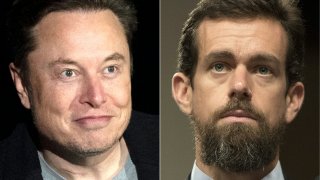
- Former Twitter CEO Jack Dorsey wanted Elon Musk on the board of the social media company, but felt the rest of its members were too "risk averse," a new court filing revealed on Thursday.
- Dorsey told Musk his power was limited because "I only had one vote, and 3% of company, and no dual class shares."
- Musk and Twitter are set to go to Delaware Chancery Court in mid-October over the Tesla CEO's attempt to get out of his $44 billion deal to buy the company.
Before the current legal saga between Twitter and billionaire Elon Musk played out in public, ex-Twitter CEO Jack Dorsey wanted Musk on the social media company's board. But he didn't see the other directors going along with him, a court filing Thursday revealed.
In a text message to Musk on March 26, Dorsey wrote, "the board is just super risk averse and saw adding you as more risk." A little over a week later, Musk did announce plans to join the board, before he changed course and offered to buy the company.
Soon after agreeing to purchase Twitter for $44 billion, Musk again changed direction and tried to back out of the deal. Twitter is suing to try and force him to hold up his end of the agreement. The two sides are set to go to Delaware Chancery Court in mid-October.
In the court filing, which is partially redacted, Dorsey said he thought the board's approach "was completely stupid and backwards." But, he explained, his power was limited because "I only had one vote, and 3% of company, and no dual class shares. Hard set up."
The two billionaire entrepreneurs had been discussing Dorsey's idea that Twitter should be "an open source protocol" funded by a foundation, rather than a company. Musk responded that the idea was "Super interesting."
Dorsey said he planned to "do this work and fix our mistakes" once he was off the Twitter board in mid-May, saying that becoming a company was Twitter's "original sin."
Money Report
"I'd like to help if I am able to," Musk replied.
Dorsey told Musk he'd wanted to talk with him about the idea "after I was all clear," adding that he'd even tried to get Musk on the board, "back when we had the activist come in." Dorsey said that at the time, "our board said no" to the proposal.
While Dorsey didn't specify what he meant by activist, the company was in a battle in early 2020 with activist investment firm Elliot Management, whose founder Paul Singer sought to replace Dorsey as CEO due to his split attention running both Twitter and Square (now Block). Twitter reached a deal with Elliot and Silver Lake that allowed Dorsey to keep his job.
After the board said no to adding Musk, according to Dorsey, "That's about the time I decided I needed to work to leave, as hard as it was for me."
WATCH: How Elon Musk's Twitter takeover plans shook Wall Street and social media






